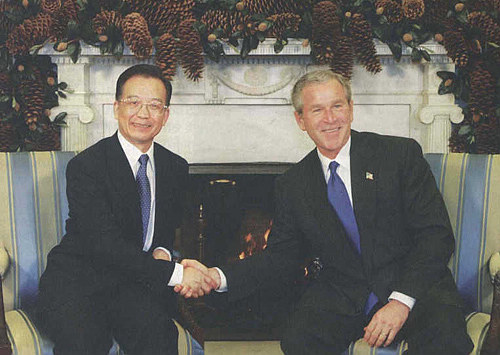|
 |
|
Chinese Premier Wen Jiabao (left) shakes hands with U.S. President George W. Bush (XINHUA) |
While the world watched, Chinese and U.S. leaders reached consensus on many issues and agreed that further improvement and growth of bilateral lies will not only benefit the peoples of both countries, but is also conducive to world peace and stability.
In his first visit to the United States since he took office in spring, Chinese Premier Wen Jiabao met with U.S. President George W. Bush at the White House on December 9 to thrash out several crucial issues.
Trade
Wen said in the talks with Bush that the expansion of China's economic cooperation and trade with the United States had not been easily achieved. Trade between the two countries was less than $2.5 billion 25 years ago, but the annual volume now has exceeded $100 billion. Bilateral economic and trade links have been conducive to the interests of the two peoples and two countries, he said.
Concerning the problems in the Sino-U.S. economic and trade relations, particularly the U.S. trade deficit with China, the Chinese premier said the Chinese Government takes the matter very seriously and has taken measures to improve the situation.
Wen proposed five principles to guide the development of economic cooperation and trade between the two countries. The five principles included mutual benefit and win-win results, development first, greater scope to coordinating mechanisms in bilateral trade and economic relations, equal consultation, and not to politicize economic and trade issues.
Bush said that by working together, China and the United States "can accomplish a lot of very important objectives."
Describing the Sino-U.S. relationship as "good and strong" Bush said the two sides are determined to keep such a relationship, for the good of the two nations and for the peace and prosperity of the world.
Taiwan
Premier Wen stressed China's fundamental policy on the Taiwan issue, that is, "peaceful reunification" and "one country, two systems."
The mainland of China will not give up its efforts for peaceful reunification as long as there is a glimmer of hope-to resolve the issue peacefully, Wen said at a joint press conference.
"We would do our utmost, with utmost sincerity, to bring about national unity and peaceful reunification through peaceful means." he said during his talks with Bush.
He added that China respects the desire of people in Taiwan for democracy, but China "can absolutely not accept and tolerate" the attempts of Taiwan authorities, headed by Chen Shui-bian, to use democracy as an excuse while attempting to resort to a "defensive referendum" to split China.
Wen said, "We have expressed our will and determination to uphold national unity. This is for the very purpose of maintaining peace and stability across the Taiwan Straits. And such stability can only be maintained through unswerving and firm opposition to pro-independence activity."
President Bush reiterated the U.S. commitment to the three Sino-U.S. joint communiques, the one-China principle, and opposition to 'Taiwan independence." The United States opposes any unilateral attempt to change the status quo of Taiwan, Bush said.
Korean Nuclear Issue
On the Korean nuclear issue, Bush said the two countries share a mutual goal, which is "for the Korean Peninsula to be free of nuclear weapons." Bush extended thanks to Wen for China's initiation of the six-party talks on the nuclear issue, and expressed the hope that talks would continue.
"We will continue to work with China and the three countries (Russia, the Republic of Korea and Japan) involved to resolve this issue peacefully," Bush said.
Four Proposals
Premier Wen put forward four proposals aimed to promote the constructive and cooperative relations between the two countries.
First, the two countries should continue with high-level visits and strategic dialogues;
Second, efforts should be made to facilitate mutually beneficial trade and economic cooperation and establish a sound mechanism to address bilateral issues;
Third, the two countries should intensify coordination on major international and regional issues; and
Fourth, people-to-people exchanges between the two countries should be enhanced. | 